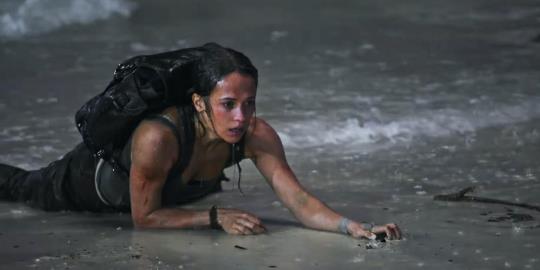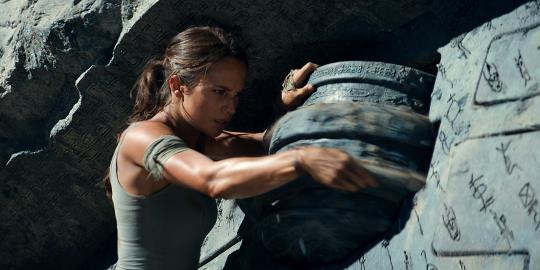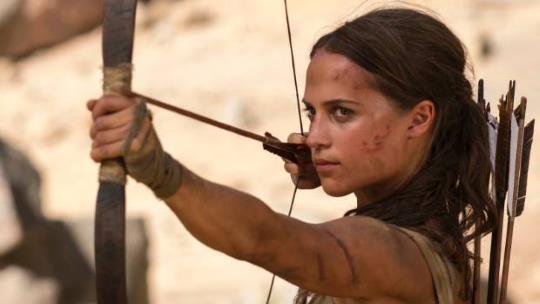Silver Screenings: Tomb Raider

At a pure basic level of enjoyment – dismissing the brain and soaking the film up like a sponge – I’d say Tomb Raider is the first video game film to be successful as a film. While I can give credit to Ubisoft’s execution of Assassin’s Creed, it is also guilty of the same flaws of its source material. Primarily, Assassin’s Creed is just so self-satisfied with its pretentious Chariots of the Gods backstory that it has become a clueless beacon of everything wrong with games narratives. I’d like to endeavor to watch the Warcraft movie in full, but what I have seen looks like a middle-schooler’s favorite fantasy novel adapted using the most expensive of cosplay armors.
In comparison I had completely forgotten I was watching a video game adaptation throughout most of Tomb Raider. There were a handful of obvious callbacks, but under most circumstances they felt more like homages rather than gimmicks. Perhaps the best thing the filmmakers did was cherry-pick plot pieces from the new Tomb Raider and its sequel and fashion them into a story of their own. “Lara’s dad is dead, and in searching for him she gets a boat to Yamatai that crashes there. Not only does she need to escape, she needs to stop an evil corporation from uncovering the tomb of Japanese death Goddess Himiko”.
Simplified so that it can fit suitably into a film’s running-time while allowing enough freedom to modify the events as necessary.
What surprised me were light modifications to Lara’s character. In the original game she’s given little civilian background for us to learn. We know she’s a scholar and loved by her friends, but the game is much more interested in taking a normal girl and awakening the survivor within. Alicia Vikander’s Lara Croft is already a fighter and proves herself to be a resourceful risk taker. Even a bit of a scamp! We can see in civilian life that she’s no ordinary girl, and that it is through her innate strength that she will be capable of suffering the trials ahead of her.
Despite a couple of logical nitpicks – why not shove her into the water if you’re going to steal her backpack? Why not toss it to your friends to flee with since she’d need to chase after it anyway? – I’m completely buying into the film for the entirety of the first half. They manage to recreate and remix a set piece from the video game in a surprisingly effective way, and Lara’s first kill is exciting and affecting. I believe the grief and discomfort she feels after forcing a man to drown.

Rather than push towards the logical next step of toughening Lara up, however, the film seems to arbitrarily swap writers. Whoever was responsible for the excellent penmanship of the first half seems to just walk away, only for a scribbler with the imagination of a clamshell to write out the rest. I’ll give the film the benefit and also assume the first writer later returned, capable of doing little more than applying white-out and making minor changes in order to salvage what they possibly could.
After a good night’s rest Lara suddenly forgot how traumatic an experience murder is and gleefully takes up arms to slay more henchmen. She finds herself in a predictable entrapment that coerces her to help the villains achieve the next step of their goal.
At this point the film improves again, but only because it’s shifted genres a bit. We’ve left the down-to-Earth, gritty story of Lara the survivor aside and turned into Indiana Jones the tabletop role-playing game. Even in this fashion the tomb feels less logical than, say, the final temple in Indiana Jones and the Last Crusade. It is a dark cavern whose finer details are tough to discern and has passages that seem to go nowhere of logical interest.
The advantage, however, is in the moment these issues do not leap out as the traps of the tomb. It feels appropriately pulpy, and just when you expect it to go full-blown Indiana Jones in its super-natural conclusion they put on a reasonable yet surprising twist. Rather than the explosive finale of the video game, the writers intelligently chose to go with something more mundane yet real. The final conflict is made no less exciting by the reduction in stakes, as Lara’s vendetta becomes personal.
The choice to scale things down is refreshing, and by the film’s end I was absolutely shocked at how much I enjoyed it.
Which is the impression I want to leave readers with before I give away more intricate plot points below the screenshot. If I were to give the film a letter grade it would be a C, but within there is the makings of a solid B+ film. This could have been alongside the best of the Marvel Blockbusters, but is instead more in line with the average output of the comic franchise. There was heart in this work, and Alicia Vikander herself clearly wrapped the role about herself like the coziest – if not a bit dirty – blanket. It is not the best film you’ll see all year, but I certainly had a good time.

That blasted mid-point.
To better comprehend why I have such a sour taste, we must first dive back into that first half of the film. Lara is incapable of accepting her father’s death. In the seven years since he had gone missing she has failed to move on. In discovering new information regarding his last whereabouts, Lara seeks the sailor her father hired to take him to Yamatai. She instead finds the man’s son, a drunkard that seems to spend most days at the bottom of a barrel. Clearly he also hasn’t been able to escape the shadow of his father’s disappearance.
We now have two characters suffering from a similar problem. This builds towards a theme. A theme! A theme in a film based on a video game! How wondrous and surprising. Clearly the characters are going to go through an arc in which they come to terms with the loss of their parents and learn to reclaim their lives as their own.
Instead, moments after Lara has just killed a man, she follows a shadow on the island and discovers that… her father is still alive!
I was tempted to groan loudly enough to earn the ire of the rest of the theater. I had to cast aside the theme I assumed the film as going for. Yes, it might be possible to salvage, but not without resembling a sloppy joe sandwich. Moreover, the only options were for the father to either be killed by the villain or to sacrifice himself in some way. Mystery of the plot was immediately removed.
The flaws only piled on as we soon find that Lara must doubt her father’s sanity. There is one point just minutes before the boat begins to crash upon the island’s shores where Lara is listening to her father’s tape recorder. It is the first instance where she seems alerted to her father’s potential paranoia.
This character trait needed to be built upon very early. Someone referring to her father as chasing one of his “crazy delusions” and for her to take offense. To see her struggling with the denial of her father’s insanity despite growing evidence that he might not have all his marbles. Her conflict with her father’s motivation to protect Himiko’s tomb would then feel more grounded and developed than hackneyed and unearned. Rather than feeling like a proper cause to her actions it feels like a script writer’s convenient shortcut.
It is for this reason that the film begins to suffer into the latter half. Not just because her father is still alive, but nothing in the first half of the film properly prepared the viewer for the character’s motivations in the latter half. It feels like the people responsible changed their mind as to what sort of movie they were making. Yes, we’ve established Lara’s physical prowess and capabilities, but damn near throwing up after your first murder only to puncture the lungs of many a man with arrows the next morning goes beyond the concept of “transformation”.
Her ally Lu Ren also fails to see much purpose in this second half, gaining little more than a hand wave of closure regarding his father. It is at this moment I realize the character only exists for the International Chinese audience. If you were to tell me there’s an additional five-to-ten minutes of footage exclusive to the Chinese version of the film increasing his importance to the central plot I would not be surprised.
Not only does this disappointment regarding his character, it also disappoints me regarding the nature of script-writing. Lu Ren could have been a kindred spirit (not necessarily romantic interest as Hollywood loves to do), someone that Lara felt such a kinship with that saving him became a reason worth killing for. Perhaps rather than stumble upon her father she simply stumbles upon the hideout he used up until he had died. She discovers her father wasn’t as crazy as everyone had believed. She simultaneously tries to rescue her friend while also trying to find a way off the island, only to open the Tomb for his life instead.
My feelings towards Tomb Raider are similar to the new Fantastic Four or The Amazing Spider-man. The first half is building towards something wonderful, but from the middle-point on typical Hollywood takes over and drags the overall product down. Unlike those two other films, however, I think Tomb Raider is still solid and enjoyable. Its flaws are not so great that they completely obliterate the film’s overall quality.
In a world where Marvel is dominating the box office, that a video game adaptation could be handled with such better respect and care than its comic book contemporaries is an achievement we should celebrate, even if it could be better.


